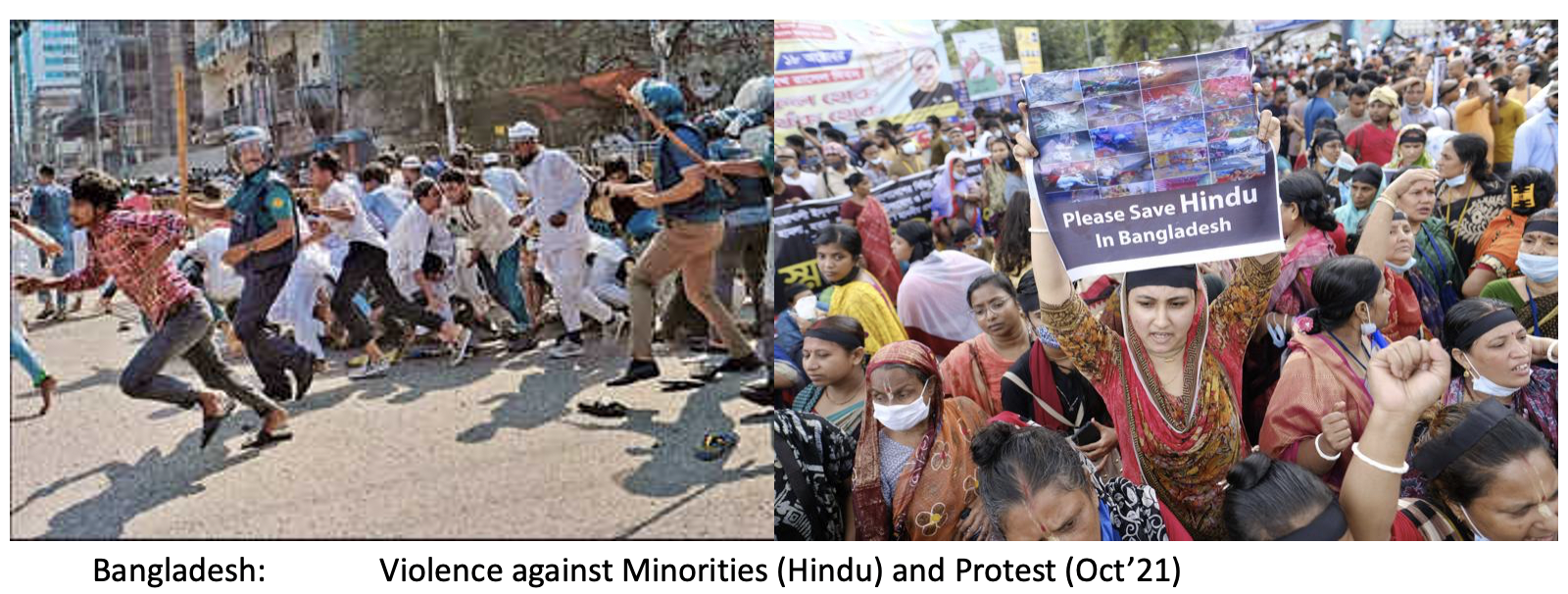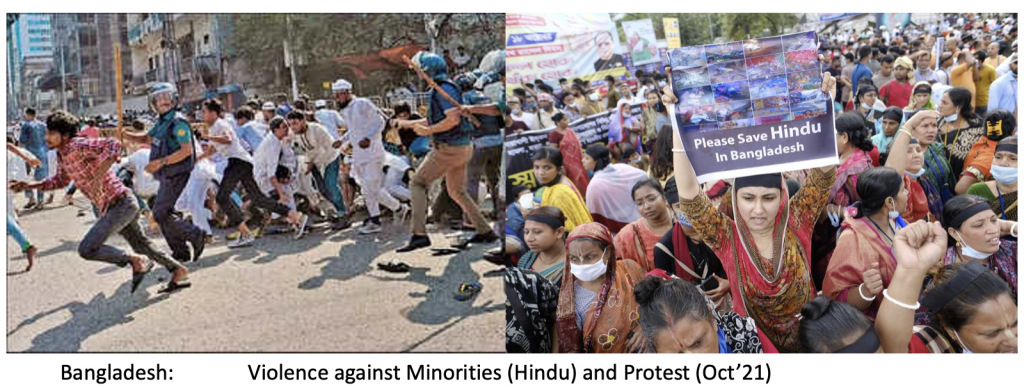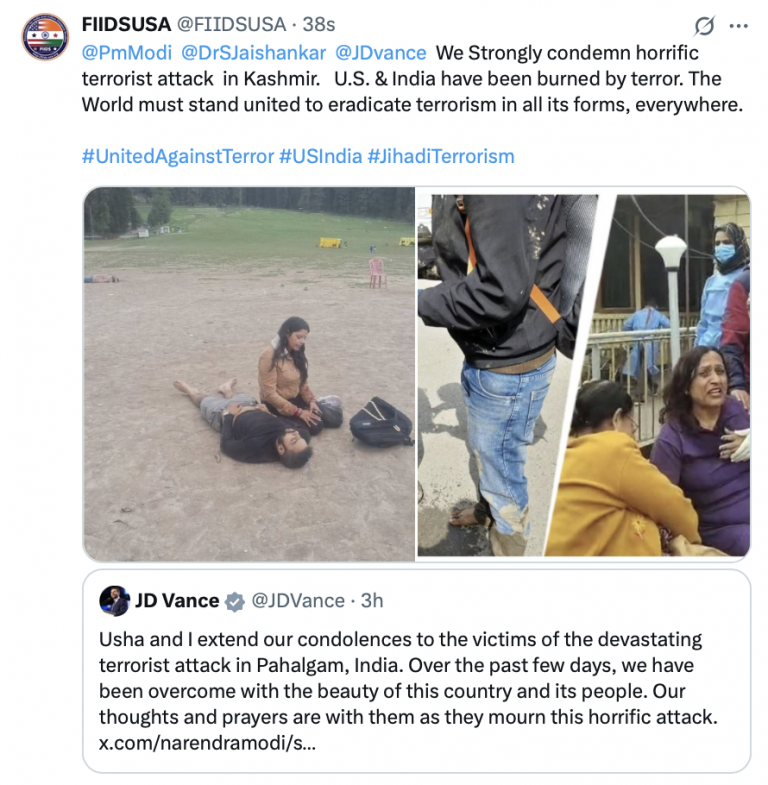
Press Release: FIIDS Calls for Immediate Action on Crisis in Bangladesh
Date: 7th August 2024
Location: Washington D.C.
Contact: Khanderao Kand khanderao@fiids-usa.org
The Foundation for India and Indian Diaspora Studies (FIIDS) expresses deep concern over the escalating situation in Bangladesh, where widespread protests and riots have led to the resignation of Prime Minister Sheikh Hasina. Amidst the chaos, there have been alarming reports of atrocities against minorities, particularly Hindus. With the police absent from the streets, the army not enforcing the curfew, and the administration seemingly paralyzed, extremist groups like Jamat-E-Islami have been reportedly committing severe acts of violence.
FIIDS has been closely monitoring and analyzing the situation. On 7th August, FIIDS held a panel discussion featuring experts such as India Foundation Executive Director Captain Alok Bansal, HRCBM Executive Director Priya Saha, and FIIDS Chief of Policy and Strategy Khanderao Kand to deliberate on the crisis and compile a set of recommendations.
FIIDS urgently calls upon:
- The U.S. President Joe Biden, and Secretary of State Antony Blinken to take immediate action to ensure peace is re-established in Bangladesh and that minorities are protected, preventing another potential Hindu Genocide.
- The interim Prime Minister of Bangladesh, Muhammad Yunus to immediately activate and instruct police forces, the army, and administrative institutions to establish peace and specifically protect minorities, who are predominantly targeted by Jamat-E-Islami. The perpetrators of these attacks must be brought to justice swiftly and decisively.
- Presidential candidate Vice President Kamala Haris and President Donald Trump to immediate make a policy statement on protecting minorities in Bangladesh
- U.S. elected officials, particularly members of the Human Rights Commissions, Foreign Affairs Committee, India Caucus, Hindu Caucus, and similar groups, to issue strong statements condemning the ongoing violence against minorities in Bangladesh.
- the United States Commission on International Religious Freedom (USCIRF) to acknowledge rising Hinduphobia and immediately issue an alert to the State Department and Congress regarding the dire situation in Bangladesh and USCIRF to hold an emergency hearing on this matter.
- the U.S. Ambassador-at-Large for International Religious Freedom Rashad Hussain to take note of the rising jihadi terrorism by groups like Jamat-E-Islami against minorities in Bangladesh. This situation carries the potential for genocide and must be stopped immediately.
- The United Nations to deploy observers and peacekeeping forces to contain the situation on the ground in Bangladesh and ensure the protection of vulnerable communities. The United Nations to convene a special session focused on the condition of minorities in Bangladesh, bringing international attention and action to the crisis.
- India’s Prime Minister Narendra Modi, Defense Minister Rajnath Singh, and Foreign Minister Dr. S. Jaishankar to leverage their influence with the new government and military of Bangladesh to establish peace and safeguard minorities. Furthermore, India should prepare to set up temporary shelters along the Bangladesh border to protect those fleeing the violence.
- The Indian American community to actively engage with their elected officials, urging them to take a firm stand to protect minorities in Bangladesh.
- Indian community leaders to organize vigils and other peaceful demonstrations to raise awareness about the plight of minorities in Bangladesh and work towards preventing any potential genocide.
The situation in Bangladesh is a dire reminder of the nation’s bloodied history, where genocidal acts in 1971 led to the killings, rapes, and forced migration of millions, drastically reducing the minority population from 22% to approximately 8% by 2022. It is crucial that the international community, led by the United States and the United Nations, act swiftly to prevent further atrocities and uphold human rights for all.
November 2021

November 2021
On the background of recent violence against Hindus in Bangladesh and ongoing atrocities over decades, Foundation for India and Indian Diaspora Studies( FIIDS http://fiids-usa.org ) recommends following short term as well as long term requests for actions to the Government of Bangladesh, Government of India, State Department of US, USAID, UN and international corporations like Walmart, Gap, etc. doing business in Bangladesh.
To provide the context, during Hindu festival of Durga Puja (worship of feminine form of God) festival last month (Oct’21), Durga Idols and temples were vandalized and rituals interrupted. Hindu homes were attacked and destroyed, Hindus were beaten to death. Hundreds of Hindus were injured and more than 7 reported as killed, however, unofficial actual numbers is much higher. This outbreak of violence is not an isolated incident. It is a part of ongoing violences orchestrated against the minorities over the last many decades. The United States Commission on International Religious Freedom(USCIRF) too noted the seriousness of the violence and expressed deep concerns on its press release on Oct 20th as, “USCIRF is gravely troubled about the recent wave of violence against Hindus that has erupted in Bangladesh…we continue to urge the Bangladeshi government to crackdown on extremist elements that fan anti-Hindu sentiments in the country”. The Freedom House in, its 2021 Freedom report, noted a concerning pattern behind such violence as “These incidents are part of a pattern in recent years in which violence against religious or other minorities appears to have been deliberately provoked through social media.”
To provide more background to our concern, due to ongoing atrocities, intolerance, and discrimination both at societal and governmental level, the minority population in Bangladesh, including Hindu, Christian, Buddhist has steadily depleted. The percentage of Hindu population came down from 33% in 1947 to less than 8.5% in 2020. In 1971, the world witnessed Bangladesh Genocide triggered by Pakistan’s Operation Searchlight, resulted in killing of around 300,000 and rapes of around 400,000 women (mostly Hindus). During the period, around 8-10 million Hindus entered India to take refuge. Bangladesh Liberation War ended up with the separation of Bangladesh from Pakistan to become a secular nation, but still the violence and discrimination continued, and intensified recently. FreedomHouse’s 2021 report covered ongoing harassment and violence against the minorities as , “Members of minority groups—including Hindus, Christians, Buddhists, and Shiite and Ahmadiyya Muslims—face harassment and violence, including mob violence against their houses of worship.” Since 2013, at least 3,600 such attacks have taken place in Bangladesh, according to Ain o Salish Kendra (ASK), a Bangladeshi human rights organisation. By the rate of elimination and exodus of Hindus, Eminent Bangladeshi economist and researcher Dr Abul Barkat predicted that there will be no Hindus left in the country after three decades.
With this background we urge following minimum recommendation to the respective authorities:
- Government of Bangladesh: As an immediate response to the recent atrocities, find and punish the culprit, establish public safety forces to establish peace and to avoid future incidents, restore temples and properties, provide safety, medical and financial support to the victims and their families. We urge the timely stringent punishments to the attackers so that such further incidents will be discouraged. To avoid such incidents in the future, the government of Bangladesh needs to eradicate the roots of intolerance from the society by public education/ awareness among majority religious institutions, scholars, as well as public education. For the peace and prosperity of the country, the government should monitor, stop and,prevent, radicalization of Muslims under the influence of Al-Queda, ISIS, Taliban, and other forms of Jihadi extremism. We also urge the government
- to fulfill its constitutional responsibility as a secular nation for equal rights to practice religion, equal opportunities in education, government jobs, and financial matters (like loan, properties)
- to facilitate reclaiming properties of the minorities which were ceased using the now-repealed Enemy Property Act (renamed as Vested Property Act) which allowed Bangladesh to confiscate properties of those whom it deems as enemies of the state (mostly Hindu minorities killed or left due to the atrocities). Under this law, Bangladesh confiscated about 1.64 million acres of about 748,850 Hindu families. Though the government under the leadership of the current Prime Minister Sheik Hasina repealed the act in the year 2001 as the Vested Properties Return Act(2001), the implementation has been minimal.
- The US Department of State: After the withdrawal from Afghanistan, there has been reports of increased ISI activities and resurrection of Jihadi terrorism in South Asia in general and India-Bangladesh in specific. As Bangladesh separated from Pakistan in 1971, a section of Pakistan ISI nurtured the dream of reuniting Bangladesh with Pakistan via violence and instability. While the unification is impossible, they at least aspire to create instability to the current Bangladesh government led by Sheik Hasina, who is the daughter of Bangladesh’s founder Sheikh Mujibur Rahman who was assassinated in a coup allegedly supported by Pakistan-ISI. On this background, we first want the US Department of State to influence the government of Bangladesh to implement recommendations provided earlier to punish culprit, prevent future violence and implement Vested Properties Return Act. We alsourge the US Department of state to probe and prohibit any designs by such operatives to use religious violence to aid global terrorism and create instability in the South Asia. We especially want increased multi-pronged efforts the Bureau of Counter Terrorism (CT) in South Asia, sharing intel on terrorist cells and working with local governments to eradicate the cells. We also urge the State department to increase cyber-vigilance of radicals who are using cyberspace to recruit across the globe, especially in the US, and South Asia.
- USAID: The United States has provided more than $1 billion in health assistance over the last 20 years to Bangladesh. As per a report, the US Aid has provided $200Million in 2019 to Bangladesh. In its Bangladesh report, the USAID mentions, “Democratic dialogue is diminishing due to government actions and targeted, extremist attacks. USAID programs support an open democratic process, human rights and a holistic approach to counter violent extremism within Bangladesh’s social and political context”. As the violence and discriminations against religious minorities are still in progress for the entire duration of the USAID’s funding, we recommend the USAID to i) pause the funding until the violence is stopped, culprits are arrested, corrective-preventive actions are in place. ii) the USAID should allocate at least 10% of the aid (approximately $20 million per year) for supporting victims of the atrocities, supporting their legal funds, improving their economic and educational opportunities, and improving public safety in the areas of risks.
- Multi-National Companies like Walmart, Gap, etc. doing business in Bangladesh: Bangladesh exports about ~$33.15billion worth of ready-made garments (RMG) out of them 80% to the United States via MNCs like Walmart, Gap. While we are encouraged by the MNCs, especially Walmart, commitment to improve the workers condition, we urge the companies to share the human rights concerns against such religious violence against Hindu and other minorities in Bangladesh. We urge the MNCs to impress on their suppliers/manufacturers to provide better employment, business, and educational opportunities to the minorities.
- The Government of India: In addition to insisting the government of Bangladesh to implement our recommendations, we request the government of India to amend its citizenship act. As the parliament of India passed an amendment in the Citizenship Act of 1955 to give citizenship to religious minorities from Afghanistan, Bangladesh, and Pakistan who took refuge in India due to persecution. However, the CAA has set Dec 31st, 2014 as the last date of entering in India for eligibility. As this deadline excludes the refugees due ongoing atrocities in those countries, especially recent violence in Bangladesh and Taliban’s power siege in Afghanistan. We recommend the government of India to consider opening up the date with adequate precautions to avoid its abuse.
Link to PR:
http://www.fiids-usa.org/actions-needed-on-atrocities-on-hindu-minorities-in-bangladesh/
Foundation for India and India Diaspora Studies (http://FIIDS-USA.org) spreads international awareness on issues and matters related to US-International relations, India and Indian Diaspora.
Contact: 202-318-7000 or info@fiids-usa.org





